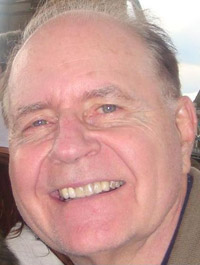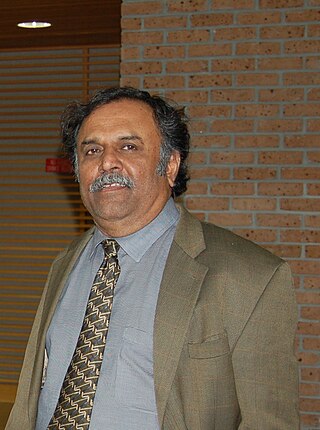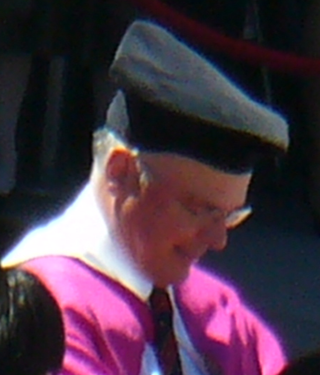Related Research Articles

Donald Oscar Pederson was an American professor of electrical engineering at the University of California, Berkeley, and one of the designers of SPICE, a simulator for integrated circuits that has been universally used as a teaching tool and in the everyday work of circuits engineers. The IEEE Donald O. Pederson Award in Solid-State Circuits is named in his honor.

Robert Owen Keohane is an American academic working within the fields of international relations and international political economy. Following the publication of his influential book After Hegemony (1984), he has become widely associated with the theory of neoliberal institutionalism in international relations, as well as transnational relations and world politics in international relations in the 1970s.
Wilbur Lang Schramm was a scholar and "authority on mass communications". He founded the Iowa Writers' Workshop in 1935 and served as its first director until 1941. Schramm was hugely influential in establishing communications as a field of study in the United States, and the establishing of departments of communication studies across U.S. universities. Wilbur Schramm is considered the founder of the field of Communication Studies. He was the first individual to identify himself as a communication scholar; he created the first academic degree-granting programs with communication in their name; and he trained the first generation of communication scholars. Schramm's mass communication program in the Iowa School of Journalism was a pilot project for the doctoral program and for the Institute of Communications Research, which he founded in 1947 at the University of Illinois at Urbana–Champaign, now housed in the UIUC College of Media. At Illinois, Wilbur Schramm set in motion the patterns of scholarly work in communication study that continue to this day.

Dietram A. Scheufele is a German-American social scientist and the Taylor-Bascom Chair in the Department of Life Sciences Communication at the University of Wisconsin–Madison. He is also a Distinguished Research Fellow at the University of Pennsylvania's Annenberg Public Policy Center. Prior to joining UW, Scheufele was a tenured faculty member in the Department of Communication at Cornell University.
Olavi Rudolf Holsti was an American political scientist and academic. He held the position of George V. Allen Professor Emeritus of Political Science at Duke University. He was noted for his writings on international affairs, American foreign policy, content analysis, decision-making in politics and diplomacy, and crises.

David Brumley is a professor at Carnegie Mellon University. He is a well-known researcher in software security, network security, and applied cryptography. Prof. Brumley also worked for 5 years as a Computer Security Officer for Stanford University.
Harry Stone Mosher was an American chemist and the discoverer of Mosher's acid.

Michael Haas is an American political scientist.

Sundaraja Sitharama Iyengar is an Indian-born American computer scientist and the Distinguished University Professor, Ryder Professor and Director of Computer Science at Florida International University, Miami, Florida, USA. He also founded and directs the Robotics Research Laboratory at Louisiana State University (LSU). He has been a visiting professor or scientist at Oak Ridge National Laboratory, Jet Propulsion Laboratory, Naval Research Laboratory, and has been awarded the Satish Dhawan Visiting Chaired Professorship at the Indian Institute of Science, the Homi Bhaba Visiting Chaired Professor (IGCAR), and a professorship at the University of Paris (Sorbonne).
Wing Hung Wong is a Chinese-American statistician, computational biologist, and Stanford University professor.

David A. B. Miller is the W. M. Keck Foundation Professor of Electrical Engineering at Stanford University, where he is also a Professor of Applied Physics by courtesy. His research interests include the use of optics in switching, interconnection, communications, computing, and sensing systems, physics and applications of quantum well optics and optoelectronics, and fundamental features and limits for optics and nanophotonics in communications and information processing.
Donald Lawrence Brenneis is an American anthropologist and professor of anthropology at the University of California, Santa Cruz. Brenneis served as president of the American Anthropological Association (2002–2003). He became co-editor of the Annual Review of Anthropology as of 2010. He has served two terms as director of the American Council of Learned Societies.
Peter Shirley is an American computer scientist and computer graphics researcher. He is a Distinguished Scientist at NVIDIA and adjunct professor at the University of Utah in computer science. He has made extensive contributions to interactive photorealistic rendering. His textbook, Fundamentals of Computer Graphics, is considered one of the leading introductory texts on computer graphics and is currently in the fourth edition.
John Wilson Lewis was an American political scientist who taught at Cornell University, before joining the faculty of Stanford University, where he became the William Haas Professor of Chinese Politics.
Donald Ray Kinder is an American political scientist and the Philip E. Converse Professor in the Department of Political Science at the University of Michigan. He is also a professor by courtesy in the University of Michigan's Department of Psychology, and a research professor in the University of Michigan Institute for Social Research's Center for Political Studies. In 2017, he was elected to the National Academy of Sciences.
Lucius Jefferson Barker was an American political scientist. He was the Edna Fischel Gellhorn Professor and chair of the political science department at Washington University in St. Louis, and then the William Bennett Munro Professor of Political Science at Stanford University. He was an influential scholar of constitutional law and civil liberties, as well as race and ethnic politics in the United States. He published works on civil liberties in the United States and systemic racism. He was also involved with several presidential campaigns, and he wrote books about the Jesse Jackson 1984 presidential campaign, for which he was a convention delegate.
Nicholas A. Valentino is an American political scientist. He currently serves as a principal investigator of the American National Election Studies (ANES).
Stephen Joseph Galli is an American pathologist who researches mast cells and basophils. He is a member of the National Academy of Medicine, a recipient of the National Institutes of Health MERIT Award, and former co-editor of the Annual Review of Pathology: Mechanisms of Disease.
References
- 1 2 "Shanto Iyengar". Stanford Political Communication Lab. Retrieved 2017-10-08.
- ↑ "DAA Awardee: Shanto Iyengar". University of Iowa Center for Advancement. Retrieved 2023-08-20.
- ↑ "Shanto Iyengar CV" (PDF).
- ↑ Badger, Emily; Chokshi, Niraj (2017-06-15). "How We Became Bitter Political Enemies". The New York Times. ISSN 0362-4331 . Retrieved 2017-10-08.
- ↑ Weeks, Linton (2014-10-15). "What Is Really Tearing America Apart". NPR. Retrieved 2017-10-08.